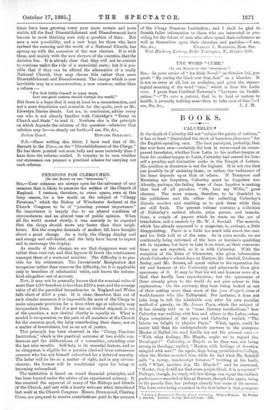PENSIONS FOR CLERGYMEN. [To THE EDITOR OF THE " EVICT/LT*8"i
&a,—Your columns are always open for the advocacy of any measure that is likely to promote the welfare of the Church of Rngland: I venture, therefore, to crave space,, even at this busy season, for a few- words on the subject of "Clergy Pensions," which the Bishop of Winchester declared at the Church Congress to be of "pressing present importance." Its importance is largely due to an altered condition of circumstances and an altered tone of public opinion. When all the world moved slowly, it was scarcely to be expected that the clergy should move any faster than their neigh- bours. But the complex demands of modern life have brought about a great change. As a body, the Clergy display zeal and energy and self-denial, and the laity have learnt to expect and to encourage the display.
As results of this change, we see that clergymen wear out rather than rust out, and that laymen ill brook the continuance amongst them of a worn-out minister. The difficulty is to pro- vide for his ,retirement. The Incumbents' Resignation Act recognises rather than removes the difficulty, for it is applicable -only to benefices of substantial value, and leaves the unbene- ficed altogether out of account.
Now, it may not be generally known that the nominal value of more than 4,000 benefices is less than 2200 a year, and the average value of all the parochial incumbencies in England and Wales falls short of 2250 a year. It is clear, therefore, that out of such slender resources it is impossible for most of the Clergy to make adequate provision for a time when age or infirmity may incapacitate them. But if a new tax on clerical stipends is out of the question, a new clerical charity is equally so. What is needed is co-operation on the part of all members of the Church for the common good, the laity contributing their share, not as a matter of benevolence, but as an act of justice.
This principle has been- observed in the "Clergy Pensions Institution," which is the practical outcome of two public con- ferences and the deliberations of a committee, extending over the last nine months. Self-help is its essential feature, and so no clergyman is eligible for a pension (derived from extraneous sources) who has not himself subscribed for a deferred annuity. The latter will be his as a matter of right, and in any circum- stances; the former will be conditional upon his being or becoming unbeneficed.
The institution is based on sound -financial principles, and has been framed under the advice of an experienced actuary. It has received the approval of 'many of the Bishops and friends of the Church, and met with a hearty welcome when introduced last-week at the Church Congress. Messrs. Drummond, Charing Cross, are prepared to receive contributions paid to the account of the Clergy Pensions Institution ; and I shall be glad to furnish fuller information to those who are interested in pro- viding for the future of men who often spend their substance as well as themselves upon their churches and parishes.—I am,
Sir, &c., CHARLES J. ROBINSON, Hon. SOC. West Hackney Rectory, Stoke Newington, N., October 10th.


































 Previous page
Previous page